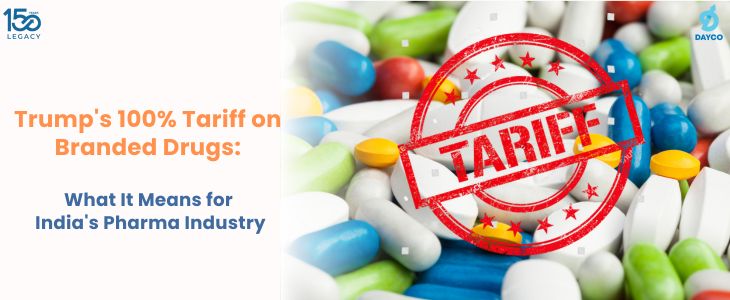Trump’s 100% Tariff on Branded Drugs: What It Means for India’s Pharma Industry
![]() September 27, 2025
September 27, 2025
![]() 0 Comments
0 Comments
The recent announcement by U.S. President Donald Trump to impose a 100% tariff on imported branded and patented pharmaceutical products has created a buzz in global pharma markets.
For India, the world’s largest supplier of affordable generic medicines, the
impact appears to be minimal. The
reason is straightforward: the tariff
does not apply to generic drugs, which form the backbone of India’s
pharmaceutical exports. While generics fill almost 40% of the U.S. market,
India’s pharma core business is cushioned from this policy shock.
Moreover, several Indian pharma giants
have established subsidiaries in the
U.S. for manufacturing, research, and regulatory operations. These local
entities often help companies navigate trade barriers more effectively,
ensuring uninterrupted access to the world’s largest pharmaceutical market.
Here’s why India’s pharmaceutical sector
remains strong, the limited risks involved, and the opportunities ahead.
India’s Dominance in Global Pharma
India, often called the “pharmacy of the world, is a global giant in supplying affordable medicines, playing a vital role in making healthcare accessible and cost-effective worldwide.
● India accounts for about 20% of the world’s total pharmaceutical exports by volume, making it the single largest supplier of generic medicines internationally.
● Drug formulations and biologics, which include a large share of generic medicines, make up nearly 75–78% of India’s total pharmaceutical exports by value in recent years.
● The U.S., the world’s largest pharmaceutical market, relies heavily on India, with 40% of its generic medicine demand met by Indian manufacturers.
This dominance highlights India’s
importance in keeping global healthcare costs under control while ensuring
access to life-saving drugs. Their cost advantage, quality standards, and
manufacturing scale have helped India build a reputation as the world’s most trusted supplier of affordable
medicines.
Major Generic Drug Exporters from India
India has become an international center
for low-cost generic drugs, providing life-saving medicines to markets
worldwide. At the center of this achievement are a number of top pharmaceutical
firms with robust global presence.
Some of the major Indian exporters shaping the global generic drug market include:
● Sun Pharmaceutical Industries Ltd. – India’s largest pharmaceutical company and a top generics manufacturer globally.
● Dr. Reddy's Laboratories – Known for its wide range of generic medicines, branded generics, and APIs.
● Cipla Ltd. – A leader in cost-effective medications, especially for respiratory care and HIV treatments.
● Lupin Ltd. – A key player in cardiology, diabetology, and respiratory therapies with a broad global presence.
● Aurobindo Pharma Ltd. – Among the biggest producers of generic medicines and Active Pharmaceutical Ingredients (APIs).
● Zydus Lifesciences Ltd. – A diversified company with offerings across generics, biologics, and vaccines.
● Glenmark Pharmaceuticals Ltd. – A research-driven firm with strengths in dermatology and oncology generics.
All these companies together allow India
to provide approximately 40% of the U.S.
generic medicine need and cater to large markets such as the UK and even the European
Union, making India an equally reliable source of low-cost healthcare
globally.
Indian Pharma Companies That Have
Subsidiaries in The United States
Many of India’s leading pharmaceutical
companies maintain multiple subsidiaries in the United States for manufacturing, research, and regulatory purposes. As multinational firms with
extensive global operations, these subsidiaries enable operational efficiency, ensure regulatory
compliance, and support business continuity across diverse markets.
Some of the major Indian pharma companies with subsidiaries in the United States include:
●
Sun Pharmaceutical Industries
Ltd
●
Dr. Reddy’s Laboratories Ltd.
●
Cipla Ltd.
●
Lupin Ltd.
●
Zydus Lifesciences Ltd.
●
Aurobindo Pharma Ltd.
●
Torrent Pharmaceuticals Ltd.
●
Mankind Pharma Ltd.
●
Divi’s Laboratories Ltd.
●
Biocon Ltd.
●
Alkem Laboratories Ltd.
●
Glenmark Pharmaceuticals Ltd.
● Piramal Pharma Ltd.
Their cost advantages, adherence to
regulatory standards, and strong global presence allow these companies to
remain competitive, even amid shifting trade policies and evolving market
dynamics.
Why the 100% Tariff Has Limited Impact
The U.S. decision to impose a 100% tariff on imported branded and patented pharmaceutical products has made headlines, but for India’s pharma sector, the overall impact remains limited. India’s strength lies in generic medicines, which are completely exempt from this tariff, keeping the country’s largest export segment secure.
Here’s how different segments are likely to be affected:
●
Generic Medicines – Safe and Stable:
Indian companies supply over 40% of the
U.S. generic drug demand, and this tariff does not apply to generics. Since generics account for the bulk of India’s pharma exports, this
core business remains strong and
unaffected.
●
Branded and Patented Drugs – Small Segment, Limited Effect:
A few Indian companies exporting branded
or patented products may face higher costs if they want to sell in the
U.S., but these products make up only a minor
share of India’s overall pharma exports. The broader industry impact stays minimal.
●
Complex Generics and Specialty Drugs – Watchful but Low Risk:
Unless the U.S. expands the definition
of “branded drugs” to include complex
generics or biologics, this segment will remain unaffected. For now, there
is no clear indication of such a
move.
●
Stock Market Impact – Short-Term Only:
While pharma stocks dipped a bit after the announcement, this was largely a knee-jerk reaction. With generics safe,
investor sentiment is expected to
recover quickly.
●
U.S. Manufacturing Requirement – Only for Select Products:
Building U.S. facilities may be needed for branded
drug makers, but since most Indian
exports are generics, the majority of companies won’t need major investments in the U.S.
In summary, though the tariff creates significant challenges for branded and
patented drugs, India’s pharma sector, led by generics exports, remains largely
insulated from the tariff, with only small
pockets of branded drug makers facing additional costs.
The Way Forward: Building on Strengths
To further secure its global position, India’s pharmaceutical industry can:
● Diversify Export Markets: Reduce reliance on the U.S. by expanding exports to Europe, Africa, and other Asian countries, creating a more balanced and resilient global presence.
● Invest in Research and Development: Focus on specialty drugs, biosimilars, and complex generics to maintain a competitive edge in evolving global markets.
● Consider Local Manufacturing: For high-value products, establishing U.S.-based production facilities may become necessary to continue exporting without tariff penalties.
● Strengthen Supply Chains: Ensure secure sourcing of raw materials and maintain cost competitiveness to support sustainable growth.
By implementing these strategies, Indian
pharma companies can mitigate risks,
adapt to global trade changes, and continue their role as reliable providers of
affordable medicines worldwide.
Conclusion: A Small Ripple, not a Crisis
Trump’s 100% tariff on branded and
patented drugs creates headlines but not a crisis for India’s
pharmaceutical industry.
Since generics remain exempt, and they form the core of India’s pharma exports, the sector’s outlook stays positive and resilient.
The road ahead requires diversification, policy engagement, and strategic investments so that India can continue to be the pharmacy of the world, no matter how global trade policies change.
-Debraj Guha Thakurta
Share With
I'm a cool paragraph that lives inside of an even cooler modal. Wins!
Are you sure?
In case you didnt know, you can open your account online within 24 hours. Offline account opening takes up to 4 working days. If you wish to open your account offline, fill and sign the forms using a black/blue ballpoint pen. Please fill in the email and mobile number of the applicant to avoid account opening delays.
Enter Password
Please enter your details and password
New to Dayco?
Enter Password
Please enter your details and password
New to Dayco?
Filing Complaints on SCORES (SEBI) – Easy & Quick
- Register on SCORES Portal (SEBI)
- Mandatory details for filing complaints on SCORES:
- Name, PAN, Address, Mobile Number, E-mail ID
- Benifits:
- Effective Communication
- Speedy redressal of the grievances
Thanks !!
Your details were successfully received.

Thank you for Your Feedback!
Our Team is working constantly on improving our user experience and your feedback really means a lot.
Thanks !!
App Link Send to your mobile number successfully.
Thank You
All your Questions have been recorded
Thank You
All your Questions have been recorded
Thank You!
Thank you for your response. We'll get in touch with you at the earlisest for your investment planning needs
NEXT
Thank You!
Thank You for your interest in our Moderate Equity Portfolio. Please find below the credentials to track this portfolio:
User ID: mockmod@daycoindia.com
Password: abcd@1234
Portfolio Tracker
Please Read!
Risk profiling is crucial for identifying and managing potential risks in investment decisions. Please carry out your risk profiling before making any investment decisions.
Complete Risk Assessment Now
Thank You !!
Please enter your details to download/print the report
Thank You !!
Please enter your details to download/print the report
Thank You !!
Please enter your details to download/print the report
Thank You !!
Please enter your details to download/print the report
Thank You !!
Please enter your details to download/print the report
Set Your Goal
Please Select an option from below
Set Your Goal
Please Select an option from below
Thanks You !
We appreciate your interest in our services. Our team will be in touch with you shortly.
CloseSet your Goal
Please enter your details in the fields provided
Thanks You!!
Calculation report has been sent to your mail id successfully
Clear form?
This will remove your answers from all questions and cannot be undone.



 Book Appointment
Book Appointment









Leave a Reply